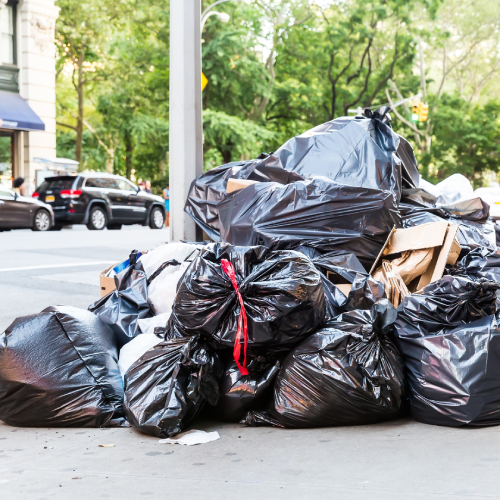Lets work together



Suite 3A, Chapel Allerton House, 114 Harrogate Road, Leeds, LS7 4NY
ukinfo@integrated-skills.com
+44 (0) 3300 888 670

Flats Above Shops (FLASH) represent a unique property category. Living in flats above commercial premises creates a complicated dynamic for residents- not least regarding their waste disposal and recycling.
Unlike purpose-built flats, which often have clear recycling guidelines and dedicated waste facilities, FLASH residents face specific challenges due to their living situation.
This article explores the difficulties FLASH residents encounter with recycling and how these issues are can be addressed through modern solutions.
FLASH properties are residential flats located above shops, cafes, restaurants, or other businesses. These living spaces are common in urban settings, where space is limited. In some cases, the commercial property owner or employees of the business may occupy the flats above, but in the majority of cases the resident is unrelated to the business below.
In FLASH properties, waste disposal rules are often less clear than in other residential settings. Visible kerbside collections, restricted time-bands for waste disposal, and shared entryways with businesses below make recycling more challenging for residents.
The issue of poor recycling rates for residents of FLASH properties is UK-wide. Many will think only of major cities like London when they imagine large numbers of flats above shops, but this set up is actually very common throughout towns and villages.
One of the primary challenges for FLASH residents is the lack of clear information regarding recycling rules. Many residents report receiving little to no communication from their local councils about recycling procedures.
This lack of guidance often results in residents relying on their own assumptions about recycling. Some simply copy the behaviour of their neighbours- both approaches often lead to incorrect practice. Unfortunately some councils are also very quick to reprimand and fine residents for these accidental rule breaks.
Shared entryways and post boxes in FLASH properties typically lead to an accumulation of junk mail and misplaced post. Important information about recycling is easily missed, especially when it’s delivered as generic leaflets or letters and not addressed to individuals.
Most FLASH properties are rented rather than sold as leasehold. This means there is a high turnover of residents moving in and out, resulting in a need for consistent messaging about correct practice.

FLASH properties often have more restrictive waste collection rules than other housing types. Waste is typically collected from the street, involving limited time-banding and specific collection points. Additionally, businesses below the flats may have separate waste collection services, leading to confusion about where and when residents can dispose of their recycling.
A lack of on-street signage further contributes to the confusion. Many residents are unaware of the distinctions between commercial and residential waste collection, leading to uncertainty about their recycling obligations. This confusion often undermines their motivation to separate recycling properly.
The lack of designated areas for on-street recycling can also lead to some embarrassment. Residents often report feeling aware that members of the public are watching them and assuming they are fly tipping or littering.
In FLASH settings, waste disposal behaviours are highly visible to other residents and members of the public. People living in these flats are often influenced by what others around them are doing:
The frequency of waste collection also plays a role in shaping recycling behaviours. In areas with daily collections, for example, waste is less visible. This can reduce residents’ awareness of how to recycle properly as they can’t see other’s contributions to compare. For those are made aware of the rules, it can encourage positive recycling behaviours as the waste is gone by morning.
In areas with weekly collections, the visibility of waste can either discourage proper disposal as residents don’t want to add to the pile on the street, or encourage it in the interest of maintaining a cleaner environment and copying the behaviour of others.

Addressing recycling challenges in FLASH properties requires a multifaceted approach. The situation could be markedly improved with the use of modern solutions and a new approach:
Given the difficulty of delivering recycling information to FLASH residents, it’s necessary to think outside the box when it comes to communications. Traditional post is clearly not working and so digital communications, community notice boards or even face to face interactions may need to be considered.
FLASH residents need clear and accessible information about recycling rules. This information needs to be made available to new residents as and when tenancies change.
Councils succeeding in this area provide concise instructions that are easy to follow. For instance, on-street signage can guide residents on where and when to provide their recycling. Information should also clarify distinctions between residential and commercial waste collection to prevent confusion. Providing detailed guidelines about recyclable materials can also help residents avoid common mistakes.
To encourage proper recycling, residents should be told what happens to waste after it is collected. Providing information about the recycling process and the impact of residents’ efforts can motivate individuals to recycle more effectively. Public awareness campaigns highlighting the positive outcomes of recycling can also enhance motivation and foster a sense of responsibility among residents.
Information like this will go a long way to changing the minds of those who believe their recycling is simply mixed in with general waste and shipped abroad.
Landlords and letting agents play a crucial role in informing residents about recycling. However, most residents in FLASH properties report minimal contact with their landlords regarding waste management.
Owners and letting agents should be encouraged to provide recycling information during the move-in process and display guidelines in communal areas. Educating them about their role in promoting recycling can lead to better-informed tenants.
Given that residents in FLASH properties are heavily influenced by the behaviours of those around them, fostering positive social norms around recycling is vital.
Councils can engage communities by involving businesses and residents in collaborative efforts to keep streets tidy and recycling practices consistent. Community involvement can create a collective sense of responsibility and pride in maintaining a cleaner environment.
ISL’s SmartSuite waste management software acts as the ‘single source of truth’ for everything related to waste & recycling collection. This means that local authority teams can:
– Communicate with residents above shops easily and efficiently
– Optimise their routes to prioritise collections in FLASH areas
– View on a map the FLASH properties in the area
– Drivers can view FLASH collection instructions on their in-cab tablets
Improved communication channels allow authorities to tell residents when their collection day is, which sack or bin should be used for what and when, or if there are any changes to the collection day for special events and bank holidays. Residents can even be reminded the night before their collection, prompting them to put their bins out at the right time.
Frequency and reliability of collection is very important for these residents. With ISL’s RouteSmart solution, local authorities can optimise the frequency for these particular areas, helping to improve behaviour. A great example is our work with Hackney council. Integrated Skills’ route optimisation allowed the local authority to seamlessly incorporate the waste and recycling collection for 6,500 FLASH properties.
By tackling the known challenges facing FLASH residents, they can be empowered to recycle more effectively. This contributes to a cleaner environment and higher resident satisfaction, and enables local authorities to hit and exceed their recycling targets.
Would you like to know more about Tackling FLASH Recycling Across the UK? Fill in your details below and let us know how we can help.
Website Designed & Built by we are CODA